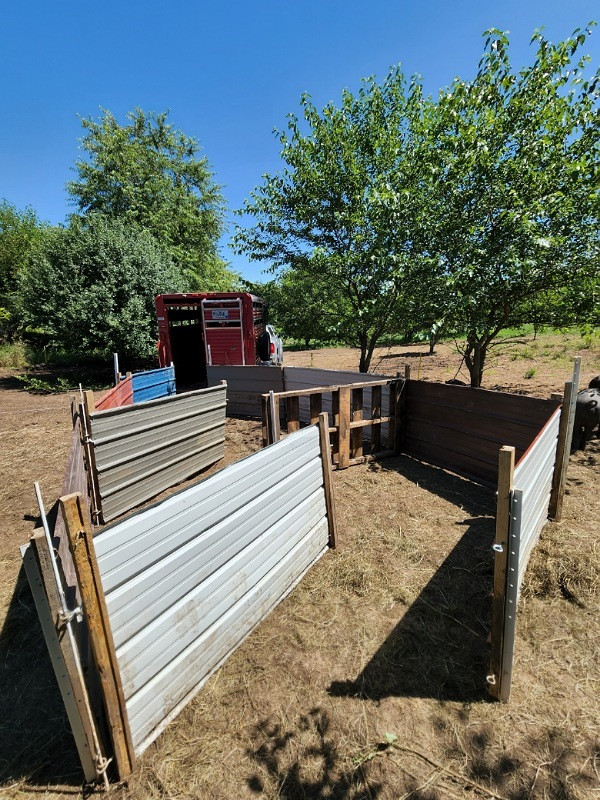How we process our pigs at Sparrow Hill Farm
posted on
August 10, 2022

As you may know, we give our pigs the best life we know how to give them on the farm. They get to forage around their pasture in the fresh air all day. And, when it's hot, they get to nap in the shade.
Yet, we are raising them to provide our family and yours high quality, nutritious food. That means there is a day when they make the trip to the processor, Avon Locker Plant, in Darlington, WI. We keep that day as low stress and smooth as possible because we certainly don't want the pig to be stressed and upset on its last day. Not only is it against the ethics we practice of respecting life here at the farm, stress also negatively impacts the flavor and quality of the meat.

I built this little pen with Aaron several days before butcher day. That gives the pigs time to get comfortable with its presence. The morning of butcher day, I feed the pigs inside the pen. And, as they are eating, I sort out the ones to take with the series of gates that are built. I take it slow. Opening and closing the gates as the pigs move around until they are all sorted out. There is also feed in the trailer. Once the big pigs are all in the last pen, I open up the trailer door. They sometimes need a little guidance in finding the door. Once they realize there is feed in the trailer, they quite willingly jump in and begin eating. I close the door. And the pigs are loaded and eating happily. I have not always been able to load them as smooth as I did on Tuesday, but it keeps getting better as I refine the process.
Once they are loaded, I take the trip to Avon Locker. It's about a 30-minute ride. There is lots of hay on the floor of the trailer to make it comfortable. Once there, the pigs are moved into a cool, comfortable little room with each other where they spend the night. This ensures they are calm and comfortable when processing time comes. In the morning, the pigs are quickly and humanely dispatched and then moved to the cooler for cutting later in the week.
I won't say every part of this process is completely stress free. The pigs are not 100% predictable and sometimes need a little extra guidance in the right direction.
I am happy that every time we load, the process goes a little better as we learn where the rough spots are and make corrections. All part of the continuous process improvement we apply to all aspects of our farm as we completely regenerate the production of food for our tables. We are constantly learning. And we anticipate we'll be learning how to do it better for as long as we farm. It's the nature of life.
As always, eat well and stay healthy!




